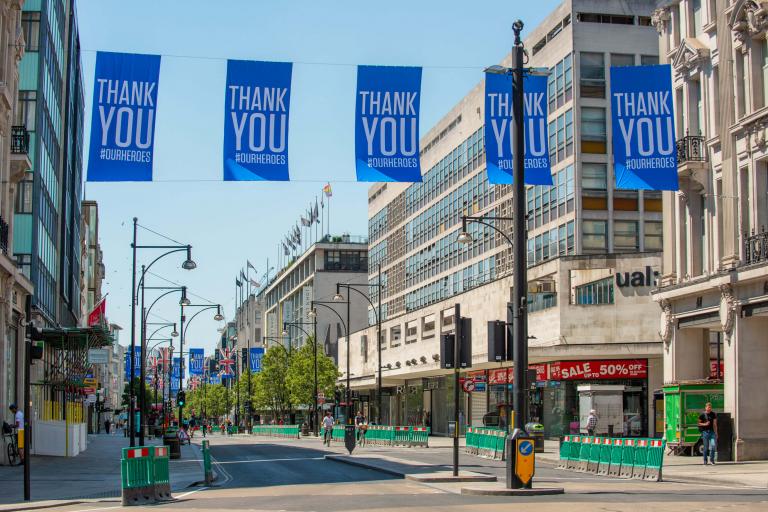Hundreds of rough sleepers leave Westminster streets
As lockdown restrictions start to ease, hundreds of rough sleepers in the capital have been supported into settled accommodation with ongoing wraparound support,

As lockdown restrictions start to ease, hundreds of rough sleepers in the capital have been supported into settled accommodation with ongoing wraparound support, so no-one should need to return to the streets, thanks to the efforts of Westminster City Council and its partners.
Since the covid-19 lockdown began in March, Westminster placed a total of 266 rough sleepers in emergency accommodation, typically hotels and self-contained apartments, to keep them safe from the covid-19 outbreak, while our outreach teams have helped hundreds more into hotels provided by the GLA. Support workers have worked intensively with individuals during this time to understand their needs and develop tailored longer-term solutions for them.
Despite the pandemic, there have been no outbreaks or Covid-19 related deaths amongst those who have been helped off the streets and into emergency accommodation, whilst hotels and other establishments have been closed to their usual customers.
Working with partners including St Mungo’s, The Connection at St Martin’s, The Passage and West London Mission, the council is confident that as lockdown restrictions ease no-one who has moved into emergency hotel accommodation should need to return to a life on the streets and more than 200 people have already been moved into more sustainable longer-term housing, including placing around 50 people into council housing, while helping others into the private rented sector.
Once people have been moved in their new home the wrap around support continues in order to help them keep their tenancy and can access other support services, such as assistance finding and holding down a job, and treatment for health and mental health issues.
Everyone housed in emergency accommodation since March has been receiving three meals a day with a total of around 137,000 meals served in Westminster since lockdown began. The council has been assisted in this huge exercise by charity partners, The Passage and Connection at St Martin’s, who have been preparing thousands of meals and organising their delivery around the city. We have also been working with volunteers through Unity Works, a social enterprise company that gives a start to people with learning and other difficulties, the Westminster Connects service and community faith groups to get meals prepared and delivered.
Westminster is the first London borough to start moving rough sleepers out of emergency accommodation on such a scale. After this weekend only around 30 people with complex needs or immigration status will remain in hotels while the council works with central Government and charity partners to find the right solution to help them in the longer term.
Unfortunately, rough sleepers remain in Westminster and there is concern that numbers may rise again as people return to the city and work will go on with those who may not wish to access support services and with very complex needs. The council will continue to do all it can with partners to support them. Those who prey on this most vulnerable group through associated criminal activity and anti-social behaviour will not be tolerated and the council will continue to work with the police and partners to address these issues.
But the council and partners are determined that the lessons learned from the pandemic will shape services for the future. A review will seek to draw in the experiences of all partners and public sector colleagues who have been involved with this work and will be looking at things like whether we can phase out shared accommodation, such as hostels, to give people their independent space as the best foundation to support them away from the streets permanently.
Councillor Heather Acton, Westminster City Council Cabinet Member for Public Protection and Licensing said: “We fully support the Government’s aim to end the possibility of people having to live on the street. We are determined that nobody who has been taken into our emergency accommodation will find themselves sleeping rough again as lockdown restrictions ease.
“There are not many upsides to the pandemic, but one is that our officers have been given an unprecedented opportunity to work with rough sleepers to offer them accommodation and the services they need to turn their lives around and live independently.
“We have already helped over 200 rough sleepers move from our covid emergency accommodation into more settled housing, as well as providing tailored support to help people get back on their feet whether that is employment, skills training or other services such as mental health or drug and alcohol support.”
Tackling rough sleeping and helping to address associated behaviours such as begging and anti-social behaviour is a priority for the council and Westminster currently spends almost £8million a year – more than any other local authority – on supporting rough sleepers and helping them find a route off the streets. We have around 400 supported housing bed spaces that we continue to support people in. The council partners with homeless charities St Mungo’s, The Passage, The Connection at St Martin’s, West London Mission, Look Ahead, Turning Point, and SHP among others to deliver a range of housing, health and outreach support services to help vulnerable people maintain their independence and prevent rough sleeping, homelessness and unnecessary hospital admission. Services include counselling to overcome drug and alcohol addiction, befriending services and employment and skills training. We also offer specialist support and temporary accommodation for female rough sleepers, including vulnerable females who are currently at risk of, or who have historically experienced, violence.
If you are concerned about someone sleeping rough please alert StreetLink using their app, or via the StreetLink website.
Published: 8 July 2020
